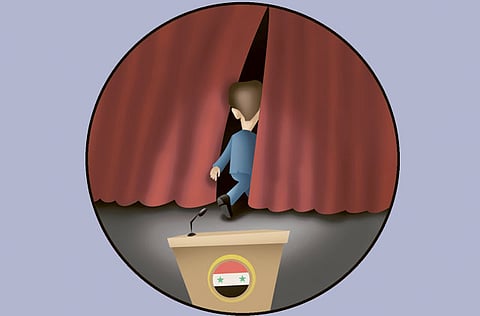Finding a way to get Al Assad to quit
One big step in the right direction would be for Russia to shift its position and stop protecting the Syrian leader

What to do, what to do about Syria? Hardly anyone is confident that the Annan mission will resolve the struggle between the Bashar Al Assad regime and the Syrian opposition. Today I want to offer a more-or-less realpolitik approach to the problem, though I am not at all certain it would work or even that it would make sense to try. Consider it an effort to think outside the box.
As I've noted before, the central problem here is that there doesn't seem to be a genuine ‘compromise' option available that would leave Al Assad & co. in place yet guarantee the safety of the opposition and their ability to organise politically. Neither side trusts the other at all, and neither can credibly commit not to try to eliminate their rivals if they get the chance. This creates the growing risk of a long and grinding confrontation and/or civil war. In this scenario I think outside powers would eventually get involved and Al Assad would eventually lose, but Syria would be in very bad shape when it was all over.
This latter outcome is not in anyone's interest, and certainly not America's. Its interests are best served if Al Assad leaves sooner rather than later, before all-out war occurs and before the entire Syrian state collapses. So the question is: Is there any way to convince Al Assad and his closest associates to leave? I don't have a surefire way to do it, but one big step in the right direction would be for Russia to shift its position and stop protecting him. In other words, what if Moscow made it clear that they were willing to grant Al Assad et al asylum if they left, but were not willing to help keep them in power any longer? Recall that it was the withdrawal of Russian support that eventually convinced Serbian president Slobodan Milosevic to capitulate in the 2000 war in Kosovo.
The circumstances in Syria are quite different, but the logic is the same: If Al Assad knew he'd lost Moscow's backing, and his associates figured this out too, they might start looking for any reasonably safe exit. Then the question becomes: How could the US and others convince newly ‘re-elected' Russian President Vladimir Putin to follow this path? I'm not sure America could, but one option would be by telling Putin that the US would let him take full credit for resolving this confrontation. Putin and other Russian leaders have consistently opposed the emergence of a world order where Washington gets to determine which regimes survive and which regimes fall.
Russian deal
For this reason, an overt attempt at Libya-style ‘regime change' is bound to upset them and encourage them to dig in their heels. But what if America made it clear that it was willing to let them take the lead (for example, by hosting an international conference to address the issue) and eager to let them have all the credit if they were able to ease Al Assad out.
As Harry Truman once noted, "It's amazing what you can achieve if you don't care who gets the credit." Now comes the tricky part. I doubt Putin would buy this sort of deal unless he got some sweeteners, and unless he thought that Russian interests would suffer if they continued their present course. In other words, the carrot of diplomatic credit might have to be accompanied by some additional carrots, as well as the subtle hint of a stick. As for additional carrots, I'd happily toss in concessions on European missile defence, which is a costly boondoggle we ought to be ditching anyway.
As for sticks, I think America will have to try to convince Russia that outside intervention is going to happen sooner or later, and that once it does, Al Assad is going to be toast no matter what Moscow does. So they can either watch a regime they've backed for 40 plus years go down the tubes — thereby reminding the world of their growing geopolitical impotence — or they can get with America and get the credit for resolving a thorny problem, thereby allowing Putin to reaffirm Russia's importance on the world stage.
There's bound to be a certain element of Kabuki theatre in all this, but that's hardly unheard of in modern diplomacy. The risk, however, is that America has to threaten to intervene itself, and Moscow might call its bluff in the hopes of luring it back into a nice Iraq-style quagmire.
—Washington Post
Stephen M. Walt writes ‘A Realist in an Ideological Age' for Foreign Policy.
Sign up for the Daily Briefing
Get the latest news and updates straight to your inbox



